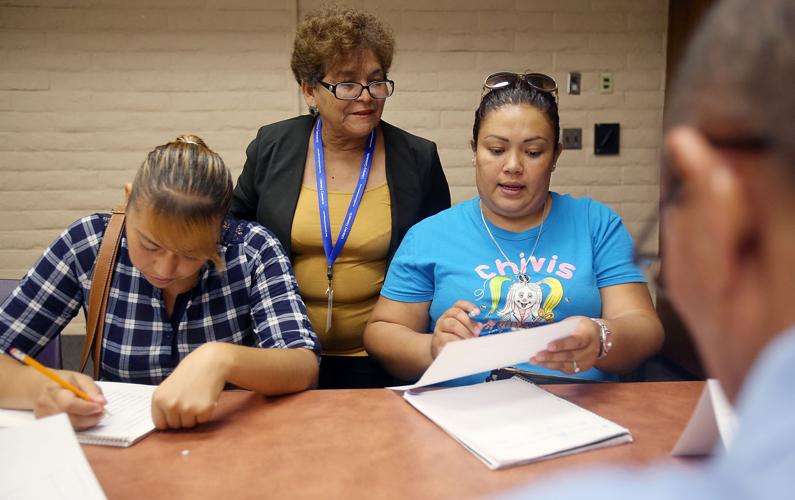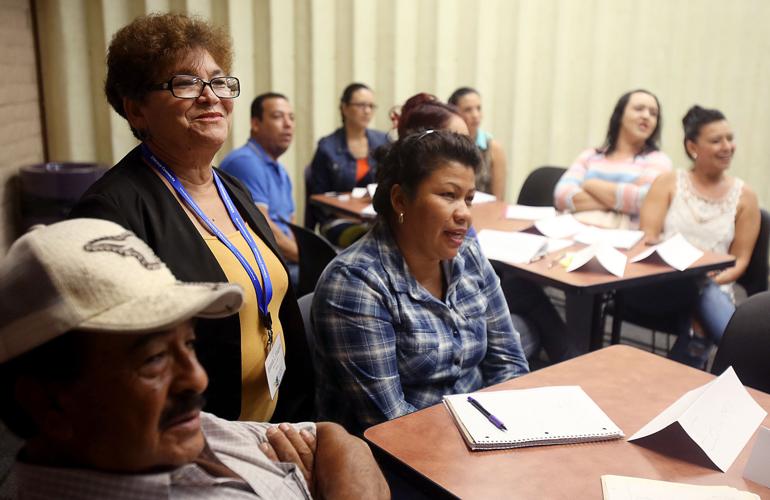The benefits of work lend more to day-to-day life than a regular paycheck. There’s also the comfort of a daily routine, the feelings of self-worth and connections with others.
Aracely Solis knows this well.
She’s been missing those extras since she moved to Tucson last year for her husband’s job.
Solis, 37, worked for 11 years in a real estate developer’s office in Nogales, Sonora, the city where she was born. After moving to Nogales, Ariz., in 2012, Solis crossed back into Mexico each day to handle payroll and human resources. She kept her job for six months after her family moved to Tucson but found the commute too much.
“I loved my career,” said Solis. “It was really hard for me to leave my job.”
Trying to find work here has been disappointing, she said. After several failed attempts, she took a cleaning job, but she’s determined it will be temporary.
To help herself along, Solis is participating in Literacy Connects’ Women RISE, a new job-readiness program for immigrant and refugee women funded by a $75,000 grant from the Women’s Foundation of Southern Arizona. RISE stands for Refugee and Immigrant Self-Sufficiency through English.
Solis is one of nine women selected — out of 30 recruits from Literacy Connects’ summer ESL classes — to participate in the first of six semester-long internships.
The women practice English, learn networking skills and about cultural differences at play when searching for work in the U.S.
Some of those subtle contrasts came as a surprise to Marisol Williams, who moved here with her American-born husband and daughter from Chile four years ago.
When a prospective employer says the inevitable, “Tell me more about yourself,” Williams said she would be inclined to talk about personal things, such as her family, because that’s what they would do in Chile. She’s glad to know now that it’s instead a chance to share more about her skills, work experience and goals.
Another difference: In Chile, the longer the résumé, the better. Also, people in most Latin American countries include a glamour shot with their cover letter.
“A lot of what we’re doing is teaching what the norms are considered here,” said Jennifer Stanowski, director of Literacy Connects’ English Language Acquisition for Adults.
The program also aims to help women feel empowered enough to make connections in their new community, Stanowski said. About 85 percent of people find jobs through their personal contacts, she said, and when you are new to an area, those connections can be hard to build.
That’s especially true for newcomers who don’t speak English. Nearly 30,000 families in Pima County are estimated to be linguistically isolated, data from Literacy Connects shows, which means no one in the household over age 14 is proficient in English.
Williams said she stayed in her house during much of her first year here because her English language skills were poor, and she didn’t have a driver’s license.
But Williams, 47, is not one to wait around for long. When a friend told her about English classes being taught at a library near her home, she signed up. She also has obtained her driver’s license and has become a U.S. citizen.
She credits her determination to growing up under Augusto Pinochet’s military dictatorship. As an older teen living in Ovalle, a city about four hours north of the Chilean capital, Santiago, she became involved in nonviolent efforts to overthrow the regime.
Those experiences shaped her, she said. Now that she’s in the United States, she wants to help immigrant and refugee women and children.
She also plans to return with her husband next summer to Ovalle to help children learn English. The couple met in Antofagasta, Chile, a port city in a mining area in northern Chile’s Atacama Desert. Williams worked there in a family-owned department store there, handling finances and helping manage the store.
Like Solis and Williams, Blanca Hugues also worked in human resources and accounting in Nogales, Sonora. She left behind a career of 19 years when her husband moved to Tucson for work.
Hugues, 68, continued working in Mexico for two more years before settling up here. She, too, found it challenging to find a job here. She took a factory job making medical devices, where she worked for 13 years before being laid off.
Since then, she has earned her high school equivalency degree and started reaching out more, including taking classes with Literacy Connects. As part of the RISE program, she is helping with ESL classes at Valencia Branch Public Library.
Hugues would like to take her new teaching experience, which she is really enjoying, and combine it with her other passion: children.
As a mother to five, grandmother to 13 and great-grandmother to three, she believes her dream job of working with young children is a perfect fit.





